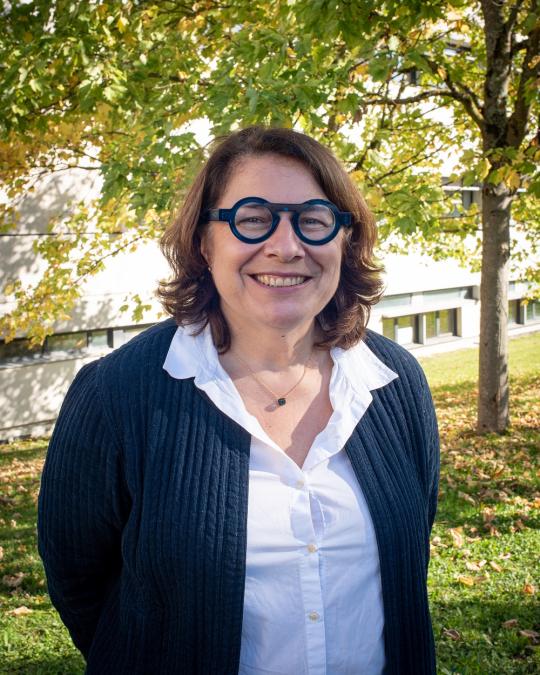Ressources dossier
Climate change and risksResearch put to the test. Interview with Sophie Nicklaus
Sophie Nicklaus, an INRAE specialist in the study of eating behaviour at the Centre for Taste and Feeding Behavior (CSGA) in Dijon, is the scientific director of the “Dijon, Sustainable Food 2030” project led by the Dijon metropolitan area. Interview.
Published on 18 January 2023


The Territories of Innovation (TI), a new model for research, development and innovation encouraged by the government via the French Investments for the Future programme in 2019, aim to accelerate transitions through greater cooperation between players as close as possible to the territories and their expectations. Deeply committed to social and food issues, the metropolis of Dijon has brought on board more than 30 partners, including INRAE, in its “Dijon, Sustainable Food 2030” project. Sophie Nicklaus explains to us how this new type of project works and the perspectives it opens up.
What are the objectives of the "Dijon, Sustainable Food 2030" project?
Sophie Nicklaus : This project targets both ends of the food chain: producing better and eating better. We see this as a virtuous circle, not as a straight line with a beginning and an end. Eating better stimulates more virtuous production practices, and producing better allows us to eat better! We analyse the quality of the soil and ascertain that it is possible to produce in an agroecological way, in particular by growing legume crops which, in addition to having nutritional qualities, enrich the soil with nitrogen and make it possible to limit the use of fertilisers and phytosanitary products. We are developing new processes with the industry in an effort to develop high quality value chains with local roots. We are also coordinating communities of citizens to identify their needs and expectations in terms of sustainable food.
Can you give us some examples of actions carried out within the framework of the TI?
S.N. : Dijon Métropole wants to develop a local legume industry. At present, it is difficult for farmers to find a viable economic model on certain plots while meeting environmental constraints on water quality or reducing the use of nitrogen fertilisers and pesticides. We therefore study the quality of soils to identify those most suitable for the agroecological production of legumes and we support farmers in adopting more environmentally friendly practices.
We also share with them our knowledge on these plants, as the Agroecology Joint Research Unit in Dijon holds Europe’s largest collection of genetic resources on pulses.
With 8,000 meals served every day, the canteen is one of the most effective levers of transition.
Another action consists of establishing a territorial label –for the moment called “Dijon Agroecology”– to certify the quality of the products. These are slightly more expensive, but they allow better social recognition and better remuneration for producers. It is then a question of ensuring outlets for these products at a fair price. The city has therefore committed itself to a purchasing policy through the collective catering it provides. For more than two years, even before the implementation of the Egalim law, children have been offered a weekly menu at the canteen in which the proteins are exclusively plant-based and, where possible, local. With 8,000 meals served every day in the canteen, the city’s purchasing power is one of the most effective levers of transition. Moreover, through the adoption of less carbon-impacting eating habits in out-of-home catering, the city also aims to influence the consumption habits of citizens for their evening or weekend meals, by changing their habits and their perception of the products. In addition, in order to ensure access “for all”, the city is financially committed through the social pricing of school meals: families pay for the canteen according to their income and, for a meal costing €12.90, those on low incomes only pay €0.50. This is decisive, especially as for some children this will be the only good, proper meal they have in the day.

Dossier Super school canteens, supported by the Territoire d’innovation programme
The Super School Canteen programme helps children choose food that is good for their health and good for the planet. The initiative is a joint endeavour with the city of Dijon and funded by Dijon Alimentation Durable 2030, a Territoire d’innovation programme. The project is led by the city of Dijon and supported by the scientific expertise of Sophie Nicklaus, INRAE Research Director at the Centre for Taste and Eating Behaviour (CSGA) at INRAE’s Burgundy-Franche-Comté centre in Dijon.
How does research work on this expected change?
Pleasure is an essential lever for getting them to adopt healthy behaviour.
S.N. : At the CSGA, we study the determinants of eating behaviour over the life course, using an approach that combines nutrition, sensory evaluation and psychology. We draw on observations or interventional experiments, both in the laboratory and in the population. For example, we are working on children’s eating behaviour: how is it rooted in the educational and family environment? How is it modified? We know that certain cognitive elements (information, for example) play an important role in changing children’s behaviour, but not only that: pleasure is an essential lever for getting them to adopt healthy behaviour. Obviously, the more healthy foods are enjoyed, the more they are consumed. The TI project allows us to study in real life the factors that would favour the acceptability of vegetarian menus by children and, in particular, the appreciation of legumes and vegetables. With more stringent requirements than set out in the Egalim law, particularly concerning the environmental impact of products and the nutritional quality of meals, we are observing children’s behaviour and their responses to the various levers of action used, such as information, experimentation, repetition and sensory education. This allows us to develop decision-making tools for Dijon Métropole. We also offer training modules for professionals. Indeed, “cooking with plants” currently accounts for only 20% of the training hours for collective catering cooks, compared to 80% for “cooking with animal products”. It is important to reverse these proportions in order to help cooks adopt more plant-based cooking practices. We are studying the practices and needs of the professions in order to understand the best ways to make them evolve. We are relying on local partners for this aspect with the Trades and Qualification Campus “Food, taste, tourism” and the engineering school AgroSup Dijon. Other INRAE studies are part of these reflections. In Dijon, Clermont-Ferrand and Versailles, for example, teams are developing new processing methods that integrate legumes into the preparation of everyday products to promote their consumption.
Is the local scale relevant to meet the food issues?
S.N. : The territorial dynamic is decisive because exchanges and meetings between stakeholders are facilitated. Long-term relationships can develop on a basis of great trust, strengthening the project. Moreover, the emotional dimension, which connects citizens and decision-makers to their territory, encourages their involvement and the development of local food supply chains. The local scale makes it possible to tackle the subject and find possible solutions, but it is obviously not enough to meet the needs of the population in terms of quantity and diversity of agricultural production. Moving towards the borders of the department, or even the region, is a natural step. The aim is not to be self-sufficient in food, but to encourage a dynamic towards greater sustainability.
How does research fit into this project, what are the mutual contributions?
It is these experiments carried out on the scale of the territory which, when capitalised on in terms of knowledge, can be transposed to a larger scale in order to achieve the expected transitions.
S.N. The project’s piloting structure meets every two weeks with the socio-economic and academic partners in order to examine the different initiatives, such as the implementation of the “Dijon Agroecology” label for quality products, in which we have been very involved. Meetings in the field complete this arrangement. For my part, I am in direct and regular contact with the city’s director of catering. On the one hand, research provides scientific results and expertise in agro-ecology, decision support, in the fields of food, nutrition, eating habits, economics and sociology. We have the capacity to develop innovations that are technical, methodological, scientific as well as organisational, with a wide variety of methods, including participatory science approaches that are crucial if citizens are to become involved in their food. On the other hand, the strong partnership with Dijon Métropole offers us a unique testing ground where we can observe in “real life” the new systems devised in the laboratory. It is these experiments carried out on the scale of the territory which, when capitalised on in terms of knowledge, can be transposed to a larger scale in order to achieve the expected transitions. This is truly fascinating work because the city has a logic of action and multiplies the levers. I very much like the idea of leaving the laboratories and seeing what our skills can do for the city! Our work will have tangible benefits for everyone, which is very rewarding.

Award 2022 - Portrait Sophie Nicklaus and eating habits: from high chair to food systems
Sophie Nicklaus is the winner of the 2022 INRAE Scientific Breakthrough Award.
Dijon makes food a nutritional, health, agricultural and social issue
Food security is one of Dijon Métropole’s key public policy issues. With the guiding notion that what we eat transforms the territory in which we live, Dijon has the ambition to achieve a profound transformation of its agri-food system, both on the production and consumption side, in order to build sustainability.
It’s a virtuous circle: produce better to eat better,and eat better to produce better.
With little industry, the city has long been committed to projects in the fields of agriculture and the environment, with, for example, the implementation of an urban plan that preserves agricultural land. Based on the principle recalled by Philippe Lemanceau, former INRAE research director and vice-president of the Metropolis in charge of the food transition, that “the agro-ecological transition can only be achieved if market and demand coincide”, the food transition has become a priority issue for Dijon with the “Dijon, Sustainable Food 2030" project.
Economic players (like Dijon Céréales, Seb, Orange and Vitagora), social players (such as solidarity grocery stores and food banks) and academic players, including INRAE, quickly rallied around the initiative. Designated in the first wave of French Investments for the Future 3 as Territories of Innovation in 2019, the project has a budget of €46 million, including more than €26 million from private funds, to experiment together and develop prototypes that can be transposed to other territories.
As Philippe Lemanceau points out, “the aim is to show that the food transition involving the agro-ecological transition is possible, and that it is beneficial not only for the environment, but also for the local economy and social cohesion, particularly between farmers and citizens, between urban and rural areas. This social component is very important: healthy and sustainable diets must be accessible to all.”
-
Élodie Regnier / Anaïs Bozino
(Send email)
Author / translated by Alessandra Riva
Communications Department
